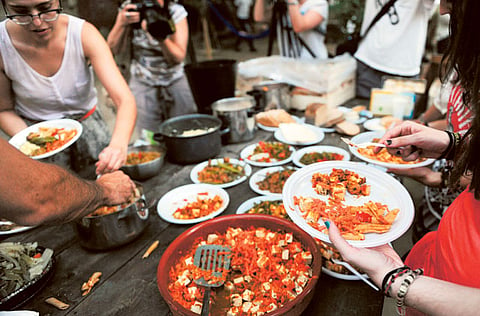Spaniards dish up tasty garbage
Environmentalists gather leftovers, fresh from the waste bin, for an open dining experience

Madrid: On a warm summer’s evening in a Madrid park about 30 diners enjoy an open-air meal of sauteed vegetables and mixed salad — all fresh from the waste bin.
It’s junk food, quite literally.
To fight waste, this group of environmentalists occasionally gathers for a “junk food” dining experience, open to the whole neighbourhood.
The previous evening, dragging their shopping carts, they ferreted through the waste bins of food shops on the hunt for discarded ingredients that are still good to eat.
After a fruitless first hour, they finally hit pay dirt in a rubbish container outside a fruit and vegetable store.
They harvested kilograms of Swiss chards, apricots, tomatoes, carrots, bananas, medlars, half a pineapple, plus cabbages, cauliflowers, peppers, celery and cherry tomatoes.
“It is a good haul. Most of it’s in good condition,” said 50-year-old Txomin Calvo.
The dinners began in 2010 when the group wanted to do something about the amount of good food going to waste.
“To make it more than just a protest, we use it to give free food to people in difficulty,” Calvo said.
The timing is right for Spain where one in four people in the workforce is unemployed and 21.8 per cent of the population were living below the poverty line in 2011.
“Some days you can find a lot of really good stuff, on others almost nothing,” said 43-year-old Luis Tamayo, another founder of the “junk food” group.
The next day at a table in a park of the working class district of Lavapies, opened to residents by the City Hall, the menu was cream of aubergine soup, grated carrots with tofu, green beans, vegetable and fruit salad.
‘Isn’t rubbish to me’ -
In addition to the ingredients found in bins, shopkeepers donated some food that had gone past the expiry date.
It had all been disinfected.
“I have no problem eating a meal like this because I know the food we throw out isn’t off,” said 44-year-old Pepe Rodriguez, who is unemployed and heard about the free dining from a friend.
“This isn’t rubbish to me. I have to say, it is really good.”
The environmentalists are on a mission to stop wastage. In Spain, the equivalent of 163 kilograms (359 pounds) of food per person are thrown out every year. Across the European Union the wastage is even higher at 179 kilograms (394 pounds).
“The aim is to try to promote moderate, responsible consumption. We don’t have unlimited resources and we have to share with those who need it more. There are a lot of people,” said Miguel Carreno, another member of the group.
The movement started off in the United States in the 1990s as “freeganism”. But it has taken on a new meaning in Spain, which is in a deepening recession and suffering a financial crisis.
In May 2011, a UN Food and Agriculture Organisation report said too many shopkeepers and consumers were throwing out food that was perfectly fit to eat because of excessive attention to outside appearance.
Activists also want to reform the law: shopkeepers are barred from donating out-of-date food and people who rummage through the bins in Madrid risk a 150-euro (Dh697.3) fine.
But for now, they just want to expand their protest with more diners. “We would like this initiative to spread to every district,” said Ignacio, a 49-year-old member of the group.
Sign up for the Daily Briefing
Get the latest news and updates straight to your inbox



